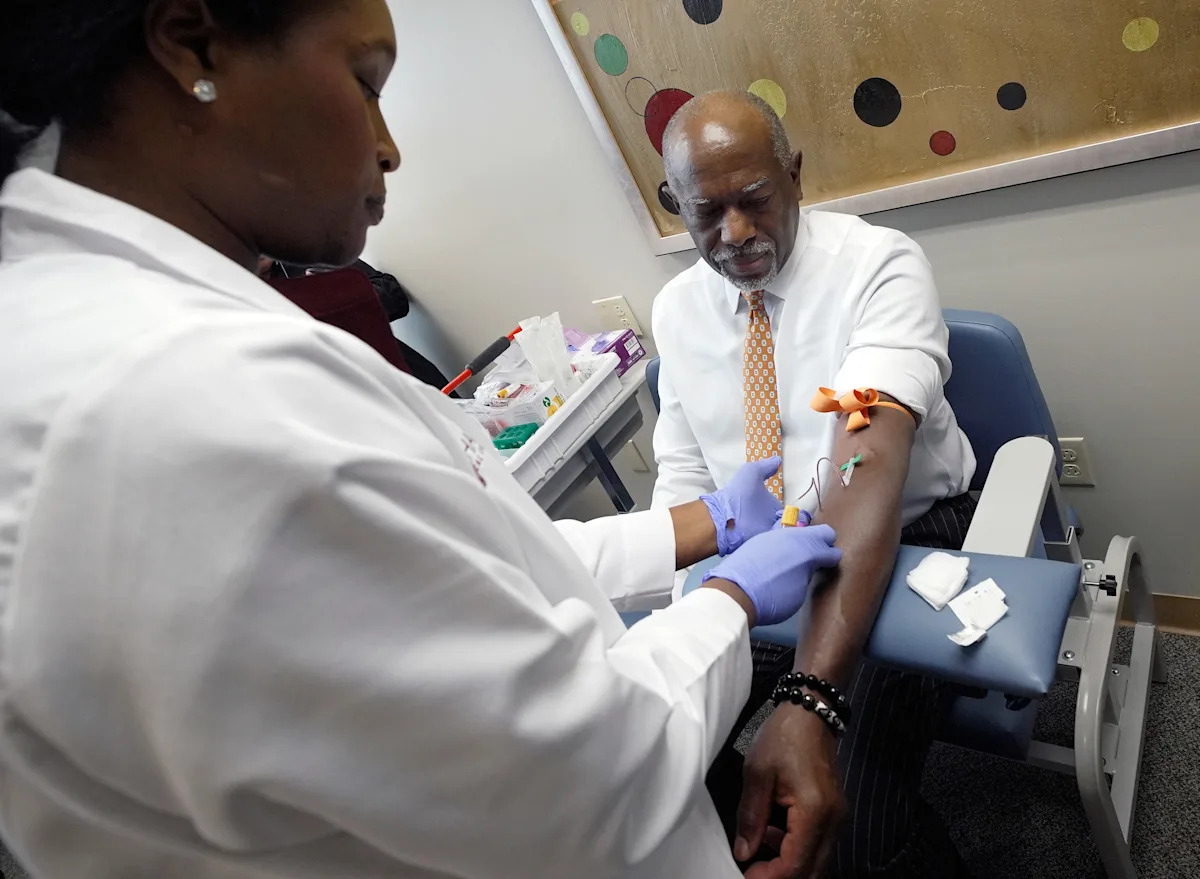Researchers at Nashville’s Meharry Medical College recently launched a groundbreaking initiative with global implications for health equity and scientific advancement.
The GREAT Health Study aims to build the world’s first comprehensive genomic and phenotype database for people of African ancestry. The project is seeking half a million volunteers from the U.S. and Africa.
Currently, people of African decent comprise 2% or less of the global genomic data — information that is essential to understanding risks of certain diseases and other ailments and is key to crafting effective treatments and preventative measures.
“We know that there are 7,000 diseases that have a genetic basis for which we have no treatment,” said Dr. James Hildreth, president and CEO of Meharry Medical College.
‘New era of scientific research’ at Meharry Medical College
Hildreth kicked off the Oct. 6 launch event by peeling off his pinstriped suit jacket and rolling up his sleeve to give blood.
“This study, which marks a new era of scientific research, will be part of finding answers,” he said.
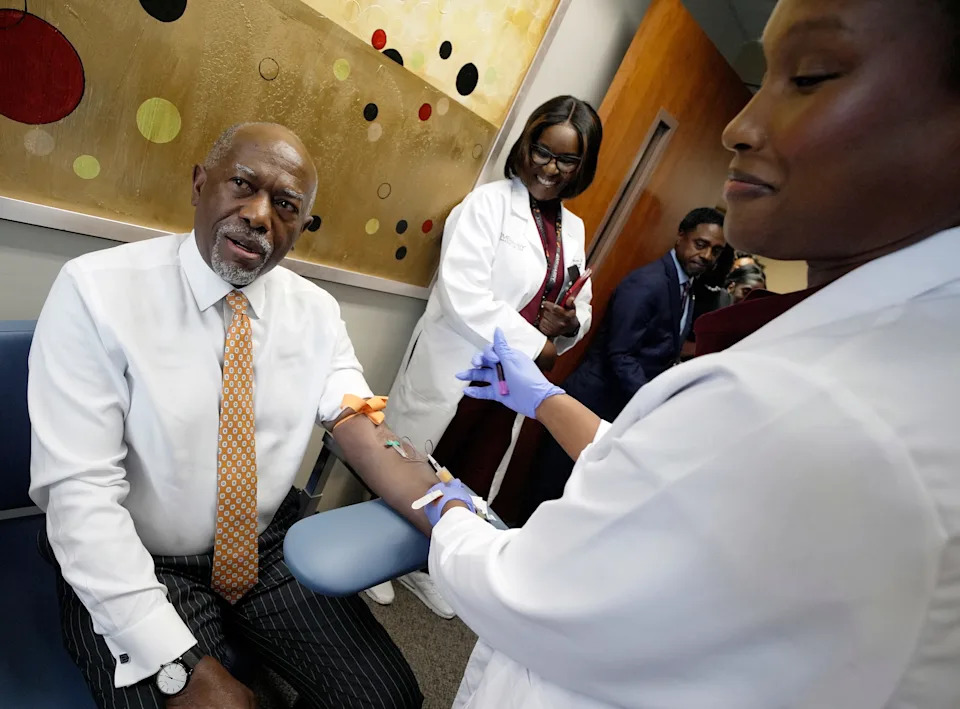
Meharry Medical College Clinical Research Coordinator Kayla Bean, draws blood from CEO and President Dr. James Hildreth as he gives blood at the Meharry Medical College’s Center for Excellence in Clinical and Translational Research Monday, Oct. 6, 2025 in Nashville, Tenn. Meharry is launching a study to increase the global genomic database to include more people of African ancestry because they now only comprise 2% or less of the data. Expanding the database will help predict disease risks and guide prevention and treatment.
Hildreth is an internationally acclaimed HIV researcher whose pioneering work has transformed the fight against the virus and advanced efforts to eliminate health disparities worldwide.
He hopes researchers at Meharry, one of the nation’s oldest and largest historically Black academic health sciences colleges, will head the creation of a more diverse gene database that will be used globally to improve the health and lives of underrepresented children and adults.
“Currently, genetic risk prediction for Black individuals is only about 25% accurate,” Hildreth said. “This study will enhance genetic predictability, improve risk assessment and ultimately allow us to address health disparities.
“Of all of the things I’ve been a part of in my career, this might be the most significant because this will have impact for generations.”
Hildreth hired Vence L. Bonham Jr., the former acting deputy director of the National Institutes of Health’s National Human Genome Research Institute, as president and CEO of Meharry’s Diaspora Human Genomics Institute, home to the study. The institute, chartered in 2021, includes in its name “Diaspora,” from an ancient Greek work meaning to disperse or scatter from your original homeland.
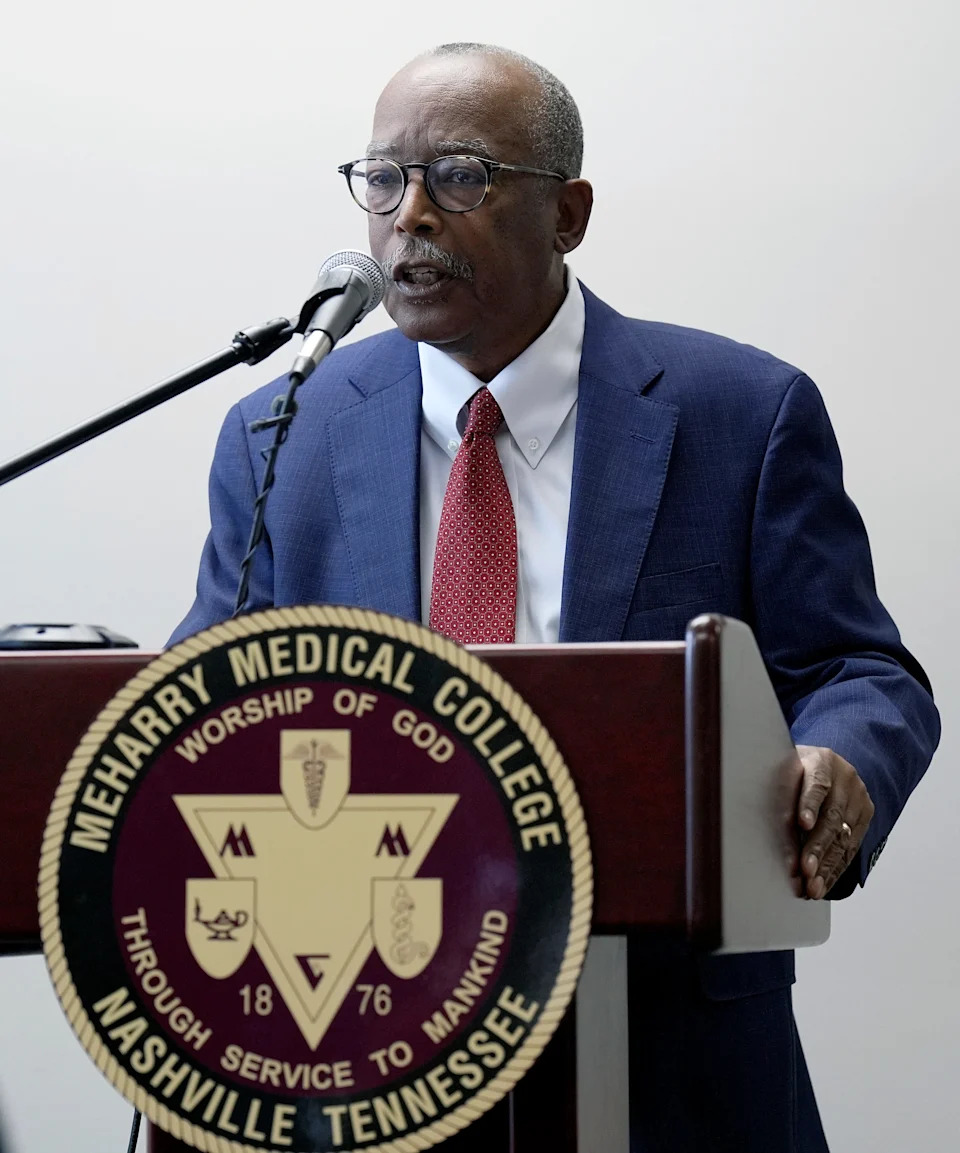
Vence Bonham, President and CEO of the Diaspora Human Genomics Institute, speaks at the Meharry Medical College’s Center for Excellence in Clinical and Translational Research Monday, Oct. 6, 2025 in Nashville, Tenn. Meharry is launching a study to increase the global genomic database to include more people of African ancestry because they now only comprise 2% or less of the data. Expanding the database will help predict disease risks and guide prevention and treatment.
“This is not just about research,” Bonham said. “It’s about reshaping health outcomes.”
The Rev. Edwin C. Sanders, senior servant and founder of the Metropolitan Interdenominational Church, addressed the Oct. 6 crowd that included several researchers who will conduct the study and others who lined up to give their blood as participants.
“Thank you for being part of a team that we know is going to make a difference that will echo, not just near, but far as well,” said the minister, who vowed to encourage his congregants to participate in the study.
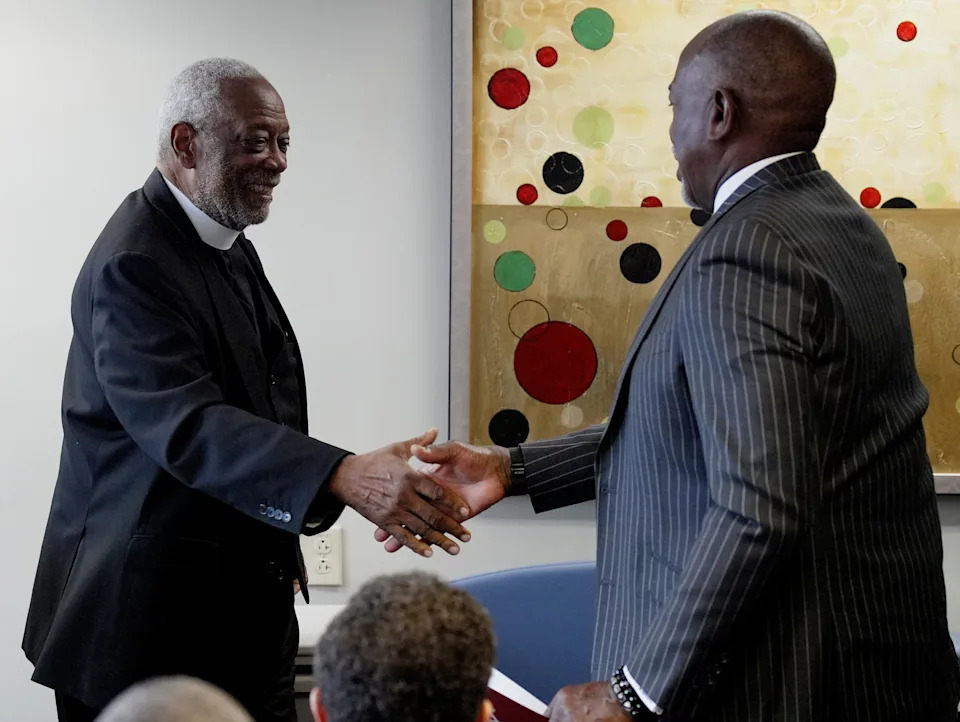
Reverend Edwin C. Sanders, Senior servant and founder of Metropolitan Interdenominational Church shakes hands with Meharry Medical College CEO and President Dr. James Hildreth at the Meharry Medical College’s Center for Excellence in Clinical and Translational Research Monday, Oct. 6, 2025 in Nashville, Tenn. Meharry is launching a study to increase the global genomic database to include more people of African ancestry because they now only comprise 2% or less of the data. Expanding the database will help predict disease risks and guide prevention and treatment.
Rajbir Singh will serve as the principal investigator of the Genomics Research Advancing Transformational Health Study and vowed to use cutting-edge genomics with robust privacy protection for participants.
The study “was born out of a simple and powerful conviction that every community deserves to see its representation,” said Singh, executive director of Meharry’s Center of Excellence for Clinical and Translational Research.
The study is a key component of Meharry’s Together for CHANGE, known as T4C, a 10-year initiative to achieve better health for underrepresented Black populations.
The GREAT Health Study emerged form a “shared dream” between Hildreth and Anil Shanker, Meharry’s senior vice president for Research and Innovation.
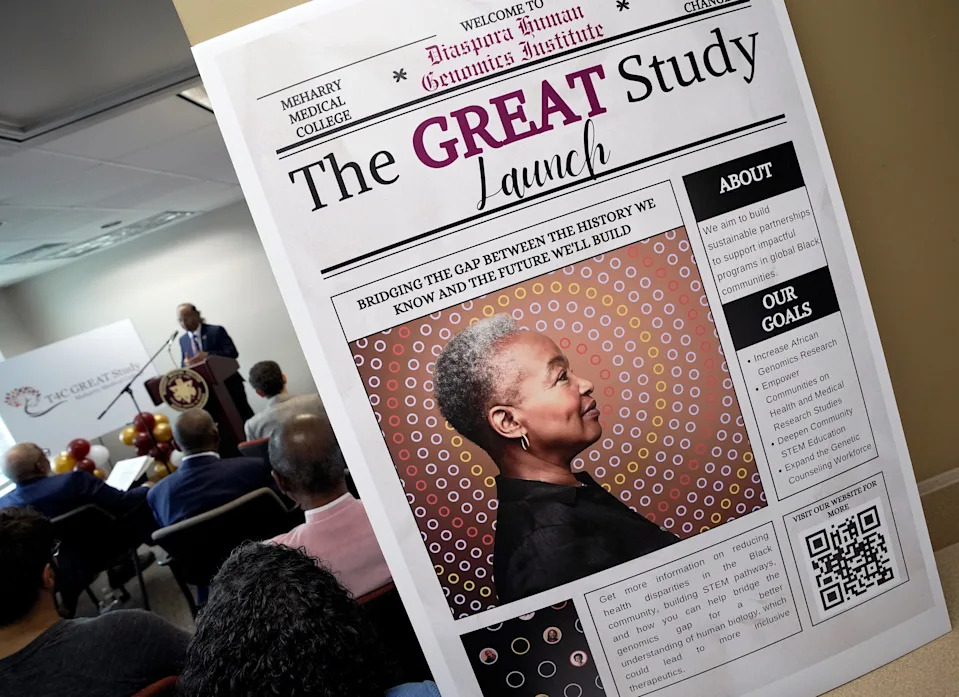
Dr. Anil Shanker, Senior Vice President for Research and Innovation at Meharry Medical College, speaks at the Meharry Medical College’s Center for Excellence in Clinical and Translational Research Monday, Oct. 6, 2025 in Nashville, Tenn. Meharry is launching a study to increase the global genomic database to include more people of African ancestry because they now only comprise 2% or less of the data. Expanding the database will help predict disease risks and guide prevention and treatment.
“This is a momentous day,” Shanker said. “Something historic is about to begin.”
Meharry researchers said they plan to reach out to other Historically Black Colleges and Universities, or HBCUs, to increase participation in the study.
“DNA is the most amazing molecule in the universe,” Hildreth said. “It’s yet to reveal all of its secrets. And when it does, treatments for diseases will be known, causes of diseases will be known.
“We, as a people, African Americans and Africans all over the world, will benefit equally as well. That’s why this project is so very important.”
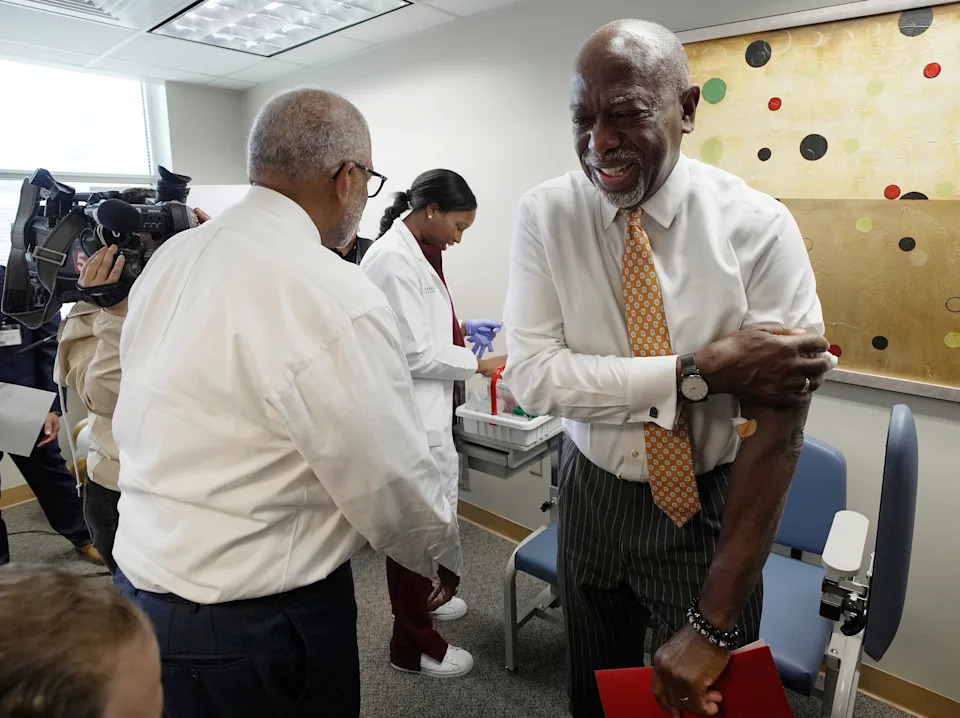
Meharry Medical College CEO and President Dr. James Hildreth rolls down his shirt sleeve after giving blood at the Meharry Medical College’s Center for Excellence in Clinical and Translational Research Monday, Oct. 6, 2025 in Nashville, Tenn. Meharry is launching a study to increase the global genomic database to include more people of African ancestry because they now only comprise 2% or less of the data. Expanding the database will help predict disease risks and guide prevention and treatment.
Meharry launches first HBCU-based DNA Learning Center
Meharry also held a ribbon-cutting ceremony Oct. 6 to open the first HBCU-based DNA Learning Center, which will give school-aged children from underserved communities more opportunities to study science.
Hildreth said he hopes to create a “pipeline” of future scientists who will return to serve their communities. He said students from across the region are encouraged to participate.
“The center will convince students who come that this is possible for them,” he said.
“We want to maximize student enrollment to maximize impact.”
Getting involved
If you are of African decent and are considering participating in the study, contact Jen Bethune or Dr. AbrahamGarcia Ortega by emailing greatstudy@mmc.edu or by calling 615-327-6044.
To learn more about the study, visit www.greatstudy.org.
Beth Warren covers health care and can be reached at bwarren@tennessean.com or on X at @BethWarrenCJ.
This article originally appeared on Nashville Tennessean: Nashville’s Meharry begins landmark DNA study of African ancestry data

